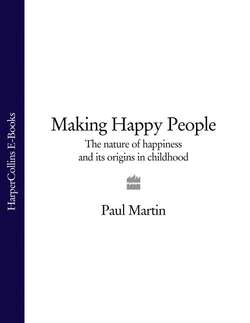Читать книгу Making Happy People: The nature of happiness and its origins in childhood - Paul Martin - Страница 21
2. Social and emotional competence
ОглавлениеA second almost universal characteristic of happy people is having at least moderate levels of social and emotional competence. To be happy, you need basic social skills to form and maintain personal relationships, together with the emotional literacy to understand and deal effectively with your own feelings and other people’s.
A socially and emotionally competent adult or child can read and interpret the feelings that underlie other people’s actions and expressions. They can work out whether another person is angry, sad, jealous or afraid, and then respond appropriately. Such skills are subtle but crucial, and not everyone is richly endowed with them. Aristotle put it like this: ‘Anyone can be angry – that is easy. But to be angry with the right person, to the right degree, at the right time, for the right purpose, and in the right way – that is not easy.’
Individuals with poor social skills are, not surprisingly, at greater risk of being socially isolated, with potentially damaging consequences for their happiness and health. Children and adults who lack emotional literacy find it hard to manage their own feelings or to understand other people’s feelings. They consequently have more problems coping with anger and aggression, among other things. Studies of school children have found that those who are poor at understanding and managing emotions are more likely to become violent. Responding aggressively may be the only tactic in their repertoire for dealing with everyday situations of conflict.
Socially and emotionally competent people are better equipped to succeed in the classroom and in the adult world of work. They tend to be better motivated, more persistent, more focused and less easily diverted by upsets or squabbles. Social and emotional competence is a stronger predictor of children’s future success than narrow measures such as exam grades. It even reduces the long-term risk of drug abuse: studies have found that teenagers with good social skills are significantly less likely to be using drugs when they are in their thirties.
